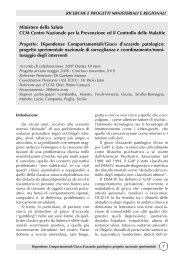Gaining health : analysis of policy development in European ...
Gaining health : analysis of policy development in European ...
Gaining health : analysis of policy development in European ...
Create successful ePaper yourself
Turn your PDF publications into a flip-book with our unique Google optimized e-Paper software.
Chapter 6<br />
258<br />
be conflict<strong>in</strong>g, and the likelihood that they will work effectively<br />
together is not exactly high.<br />
• Stakeholder <strong>analysis</strong>. A formal stakeholder <strong>analysis</strong> can<br />
help ensure that important partners are not forgotten.<br />
• Secur<strong>in</strong>g appropriate leadership. Leadership from a level<br />
above that <strong>of</strong> the m<strong>in</strong>istry <strong>of</strong> <strong>health</strong>, or from a sector<br />
with outstand<strong>in</strong>g knowledge and experience <strong>in</strong> a particular<br />
area, can be effective.<br />
• Agree<strong>in</strong>g on the terms <strong>of</strong> collaboration. Formal agreement<br />
on the terms and process <strong>of</strong> <strong>in</strong>tersectoral collaboration<br />
can ensure a common understand<strong>in</strong>g <strong>of</strong> the aims<br />
and objectives, and the means <strong>of</strong> deal<strong>in</strong>g with possible<br />
conflicts <strong>of</strong> <strong>in</strong>terest.<br />
• Listen<strong>in</strong>g to potential partners. A national NCD <strong>policy</strong><br />
can be effectively implemented only through community<br />
participation and partnerships at central, regional and<br />
local levels. Much more could be done to strengthen<br />
the l<strong>in</strong>ks between levels <strong>of</strong> governance, not only to<br />
support local levels <strong>in</strong> tackl<strong>in</strong>g NCD but also to listen to<br />
and learn from them, creat<strong>in</strong>g a two-way rather than a<br />
top-down <strong>policy</strong> process.<br />
• Utiliz<strong>in</strong>g the sett<strong>in</strong>gs approach. Sett<strong>in</strong>gs where people<br />
live, work, learn and play <strong>of</strong>fer a huge but underutilized<br />
potential for tackl<strong>in</strong>g NCD. In particular, schools and<br />
the workplace <strong>of</strong>fer broad opportunities for action <strong>in</strong><br />
tackl<strong>in</strong>g NCD.<br />
• Work<strong>in</strong>g with the private sector. The emerg<strong>in</strong>g practices<br />
<strong>of</strong> CSR <strong>in</strong>dicate important new partners <strong>in</strong> the private<br />
sector. There are excit<strong>in</strong>g opportunities for further<br />
action to tackle NCD <strong>in</strong> the workplace and for the<br />
<strong>development</strong> <strong>of</strong> <strong>health</strong>ier products, but also for tak<strong>in</strong>g<br />
advantage <strong>of</strong> knowledge and skills available <strong>in</strong> the private<br />
sector for solv<strong>in</strong>g problems. Regular partnerships with<br />
the public sector may strengthen and <strong>in</strong>crease capacity,<br />
provided agreements can be reached on pr<strong>in</strong>cipal social<br />
values such as equity <strong>in</strong> <strong>health</strong>.<br />
Reduc<strong>in</strong>g social <strong>in</strong>equalities related to NCD<br />
It is clear that there is rapidly grow<strong>in</strong>g awareness <strong>of</strong> the<br />
need to tackle socioeconomic <strong>in</strong>equalities <strong>in</strong> NCD, and opportunities<br />
for do<strong>in</strong>g this are already be<strong>in</strong>g explored.<br />
• Reflect<strong>in</strong>g socioeconomic <strong>in</strong>equalities. Particularly <strong>in</strong> EU<br />
countries and through programmes such as CINDI,<br />
standardized and comparable data for measur<strong>in</strong>g socioeconomic<br />
<strong>in</strong>equalities <strong>in</strong> NCD are be<strong>in</strong>g developed.<br />
Guidance and examples <strong>of</strong> good practice are available<br />
for all countries to ensure that regularly compiled data<br />
reflect socioeconomic <strong>in</strong>equalities.<br />
• Utiliz<strong>in</strong>g the work <strong>of</strong> the WHO Commission. The work<br />
<strong>of</strong> the WHO Commission on Social Determ<strong>in</strong>ants <strong>of</strong><br />
Health has further clarified some <strong>of</strong> the <strong>policy</strong> pathways<br />
for tackl<strong>in</strong>g <strong>in</strong>equalities. The results <strong>of</strong> this work could<br />
be usefully dissem<strong>in</strong>ated among those responsible for<br />
NCD <strong>policy</strong> at national and local levels.<br />
• Tak<strong>in</strong>g gender differentials <strong>in</strong>to account. NCD and their<br />
risks can affect males and females differently, and their<br />
needs for support may also differ. However, the gender<br />
aspects <strong>of</strong> NCD <strong>policy</strong> and programmes are not always<br />
given sufficient attention.<br />
• Tailor-made solutions. Research has shown that the highly<br />
educated pick up general <strong>health</strong> education messages<br />
more quickly than their less educated counterparts.<br />
Health communication tools for <strong>health</strong> promotion and<br />
<strong>in</strong> the area <strong>of</strong> <strong>health</strong> care must be tailored to meet<br />
the specific needs and cultural situations <strong>of</strong> vulnerable<br />
groups, <strong>in</strong>clud<strong>in</strong>g, for example, those with a low level <strong>of</strong><br />
education, the poor and unemployed, migrants, older<br />
people and ethnic m<strong>in</strong>orities.<br />
• Consider<strong>in</strong>g the impact on disadvantaged groups. The<br />
potential impact <strong>of</strong> any NCD <strong>policy</strong> on disadvantaged or<br />
high-risk groups needs to be assessed.<br />
• Policies for social groups. The <strong>development</strong> <strong>of</strong> comprehensive<br />
policies to tackle NCD <strong>in</strong> specific social groups<br />
such as older people, women, adolescents, the Roma or<br />
migrants could prove effective <strong>in</strong> some countries.<br />
Po<strong>in</strong>ters to the future

















